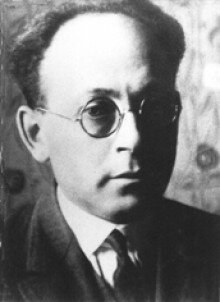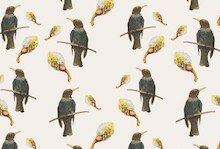
“I love him very much,” says Lilach Netanel, the scholar who discovered the manuscript of Vogel’s lost novel ‘Viennese Romance’ last year. “He was something of a total failure when it came to doing things. He never held a job, he abhorred economic life. When he was in Palestine he was offered a job teaching Hebrew at the Gymnasia Herzliya [high school], but he stammered a couple of words and said nothing. [It] is plain to see that the arena in which Vogel functioned was night, not day.”
Modernist Hebrew poet David Vogel was born in the town of Satanov, Podolia, in the Russian Pale of Settlement on May 15, 1891. Like many, he moved west to the big cities. In 1909 or 1910 he arrived in Vilna as a yeshiva student, earned a living as a synagogue caretaker and worked to improve his Hebrew. It was in this period that he had the affair with [a] mother and her daughter [that he fictionalized in “Viennese Romance”]. In 1912 he went to Vienna and lived a life of loitering and cafes. He learned German and barely eked out a living by giving Hebrew lessons. His diary, coupled with testimonies of people he met, suggest that he was introverted and reticent, a stranger to the practicalities of life, so he constantly suffered from want and hunger.
In the superb introduction written by the poet Dan Pagis for Vogel’s “Complete Poems” (published posthumously), he quotes Hillel Bavli’s description of the poet: “A young man of about 20, dressed in faded apparel, wearing a broad-brimmed black hat and with melancholy, wondering eyes. He was very withdrawn, a man of few words. His pale face always seemed drawn and tired.”
In 1914, the outbreak of World War I posed a problem for Vogel and other Jewish writers in Vienna. A Russian subject in Austria, Vogel was arrested as an enemy alien and spent time in internment camps [. . .] In 1925, Vogel obtained an Austrian passport, but decided to leave Vienna and settle in Paris [. . .] In 1929, in honor of the publication of his first novel, “Married Life,” the only one published in his lifetime, Vogel decided to immigrate to Palestine. But after only a year, he returned to Europe with [his second wife] Ada and their daughter Tamar, who was born in Palestine [. . .] In 1932, after residing in Poland and Berlin, where Vogel tried, unsuccessfully, to translate “Married Life” into German, the family returned to Paris. When World War II broke out, Vogel and his daughter fled to the town of Hauteville, in southeastern France, where his wife was recuperating in a sanatorium for patients with lung ailments. He was interned by the French as an Austrian citizen and released after the Nazi occupation of France in 1940.
In his work and life, “Vogel always belonged to the wrong camp,” [Tel Aviv University] Prof. [Michael] Gluzman says. “In Vienna he’s arrested as a Russian subject, in France he’s arrested as an Austrian subject and after being released he is arrested as a Jew. This posture of not belonging, of otherness, is a matter of principle with Vogel. It’s not only the randomness of history – after all, when he was given the chance to become a citizen in Vienna after the First World War, he chose to move to Paris just then. It was the same in Palestine: he received a certificate [of immigration] but decided to leave. He was later blamed for wasting two certificates. There is something in Vogel that makes him want to go on being an outsider. It is a refusal to anchor the language in a particular territory, above all in the national territory in which it becomes the natural spoken language. That is a basic stance of Vogel’s.”
Although Vogel wrote in Hebrew, his work, in contrast to that of other Jewish writers in this period, was completely unrelated to the Zionist project and to the revival of Hebrew as part of the national renaissance. Why, then, did he write in Hebrew?
“To revive a language is a saliently modernist act,” Gluzman says. “Ezra Pound came up with the phrase that became the motto of modernism: ‘Make it new.’”
For years, Vogel’s fate was unknown. “Beginning in 1944-1945, the Hebrew press in Palestine published reports about Vogel’s disappearance,” Netanel says. “Stories and rumors abounded. According to one very poetic account, he was caught and put aboard a train for a death camp, but at the last moment jumped from the train and then was shot in the back. Another story had it that he escaped from the Gestapo but at that very moment suffered a stroke and died. He was even supposedly given a funeral.
In 2001, the literary scholar Dan Laor undertook a comprehensive study [. . .] According to an article he subsequently published, Laor found that after Vogel was released from the internment camp, he returned to Hauteville and lived there until 1944, when he was arrested by the Gestapo and taken to a prison in Lyon. He was then transported to Drancy, a transit camp for French Jews bound for the death camps. The documents Laor found show that four days after arriving in Drancy, Vogel was transported to Auschwitz and murdered there.
BIBLIOGRAPHY
Poetry
Lifnay ha-sha’ar ha-afel (Before the Dark Gate), Vienna, Mahar, 1923.
Facsimile Hebrew edition: Tel Aviv, Hakibbutz Hameuchad, 2012.
English: London, The Menard Press, 1976, reprinted in A.C. Jacobs: Collected Poems and Selected Translations, London, Menard, 1996.
Fiction
Haiyay Nisuim (Married Life), Tel Aviv, Hakibbutz Hameuchad/Siman Kria, 1986/2000
English: London, Peter Halban, 1988; in paperback: 1998; New York, Grove Press, 1989; New York/London, Toby Press, 2007
in Italian: Milan, Adelphi, 1991; Milan, Gli Adelphi, 1999
in French: Paris, Stock, 1992
in German: Munich, Paul List, 1992; in paperback: Frankfurt, S. Fischer, 1994
in Dutch: Amsterdam, Meulenhoff, 1992/98; in paperback: Amsterdam, Meulenhoff - Quatro, 1992; 2002; 2007
in Chinese: Hefei, Anhui Literature and Art Publishing House, 1998
in Russian: Jerusalem/Moscow, Gesharim/Mosti Kulturi, 2003
in Turkish: Istanbul, Yapi Kredi, forthcoming
LINKS
MUSIC
Listen to Yehudit Ravitz sing ‘On Autumn Nights’
ENGLISH
Read a music critic’s comments on the arrangement of ‘On Autumn Nights’ set to music by Shem Tov Levy
Vogel’s context: On Hebrew poetry in Eastern Europe c. 1800 to the 1940s from the YIVO Encyclopedia of Jews in Eastern Europe
Two versions of one poem:
‘THERE IS A LAST SOLITARY COACH’
A translation of ‘On Autumn Nights’ by AZ Foreman
How a lost Vogel novel was found.
A review of ‘Viennese Romance’
HEBREW
‘On meeting Vogel in Paris in 1937’ by Manda-Levy.
Three of Vogel's poems.
An article on Vogel as a ‘hidden’ poet.
Sponsored by POETRY PLACE







